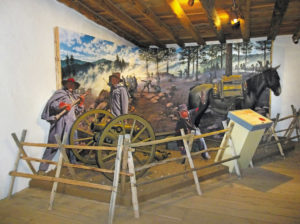By Martha Quillen
By October, I found myself thoroughly bewildered by conflicting viewpoints about Salida’s attorney, Ben Kahn. To hear local activists tell it, he is either terrific or incompetent, which put me in a wait and see mode. But then a candidate told me he thought getting rid of Kahn was an important objective, and I thought in that case I’d better re-evaluate some things before I vote.
So I checked some local online sources and went way back in the records to refresh my memory. And all I got was eyestrain.
The first thing I noticed was that Salida now posts records galore – a good thing, I think. But this wealth of exhaustingly extensive and legalistic information is not particularly helpful in making voter choices – a fact made clear to me after I talked to several candidates and watched the October 17 Salida council meeting.
In Salida, there are two competing sides that both contend the records speak for them. However, the only thing the records told me is that citizens on both sides are confoundingly certain about things that are complex, opaque and open to interpretation.
Posted materials on the City of Salida website include copies of legal documents, and reports, and minutes of meetings, and more details about the Salida Natural Resource Center Development Corporation (NRCDC) than any ordinary citizen could possibly evaluate without the help of several independent lawyers, a whole firm of accountants, and help from the Washington Post or New York Times (or some similarly well-funded press operation).
If you’ve got a hundred hours to spend, you too can peruse accounts of what the NRCDC was intended to do and how it was supposed to work, its function in legal terms, and its limits and responsibilities, along with resolutions declaring Whereas this and Whereas that and Whereas whatever for page after page after page ….
[InContentAdTwo] And it’s as clear as mud. That’s transparency for you. When people don’t really understand what’s going on, reams of paperwork don’t make it clearer. And when you add the articles, letters and documents on the Mountain Mail, Salida Post, Salida Citizen and One Salida sites? And listen to some old radio interviews? You end up immersed in conflicting views from attorneys and citizens, which merely make it clear that Salidans haven’t agreed on much for a long time.
On the whole, however, the city appears to be doing all right, as evidenced from the candidate forums, which aired ideas that were impressive, informed and insightful, and the preliminary audit report, which was presented at the last council meeting (October 17).
Salida’s citizens, however, are another story. A good many of them are divided, feuding and emotionally wrought. And in recent years a whole new style of public communications has evolved nation-wide and in Salida. Political discourse is showier, more attention-grabbing, and increasingly given to speculation, conspiracy theories, one-sided partisan influence, lawsuits, exaggerations, claims, counterclaims, ceaseless promotion and open hostility.
In our town, two major sides have developed, and they seldom fight about issues. Instead they generally fight about the perfidy of the other side and its poor attitude, bad viewpoints and dubious motives. Citizens likewise wrangle about who should or shouldn’t be on the council, or listened to at all. This tendency to support or suppress people rather than discuss issues has become so notable that some of my friends insist that Salida’s fights aren’t about what should be done. They are about who should be in power.
At first, I viewed that notion as cynical and inflated. But then I realized it was likely true. Yet what difference does it make when both sides clearly believe the other one is dangerous and misguided?
Under the circumstances, the more relevant question is “Could they both be right?”
That is certainly possible. But such fights aren’t really about right and wrong; they are about what people want. In Salida, one side generally favors new trails, real estate developments and multi-million-dollar recreational facilities, while the other prefers better maintenance, street repair and keeping sidewalks shoveled. And together they actually provide some balance.
Yet I hate how we carry on, and I suspect most people do, because too many of our dealings are uncivil and involve flagrant discourtesy. In Salida, opposing political camps battle as if Western Civilization depended on it, fiercely defending positions such as whether big-name concerts or newly paved streets are more important. And citizens from both sides clamor to jettison elected officials or fire public employees. And people get hurt and lash back. And the town increasingly feels different.
At a recent candidate forum, all of the participants vowed their devotion to preserving Salida’s small town ambiance and Mayberry-like essence. But Salida isn’t Mayberry. Mayberry doesn’t have thousands of tourists arriving on weekends, and doesn’t have to worry about housing shortages, families sleeping in frigid cars and whether the national economy might tank and thereby sink tourism.
Yes, Salida still has a touch of small town bonhomie. But the discussion at the October 17 council meeting would suggest the only way to preserve our small town friendliness would be to have one contingent or the other leave – unless one side is willing to sacrifice its democratic rights.
So why is this happening? It’s a national trend. Citizens all across America are spewing partisan anger, and terrible things are happening to vulnerable blacks, immigrants, police officers and entire crowds of people targeted by violent misfits. And hard times are falling on people who don’t earn enough to get by in a nation where the rich keep getting richer, while the poor fall behind.
But those who are suffering the most are not the ones shouting with resentment. The bitter spokespeople in our culture are the middle class citizens who feel ignored by their government, neglected by their representatives and vilified by their fellow citizens.
And they are right to be miffed. What passes for listening in political arenas today generally entails waiting for a person to finish speaking before denouncing him. Such open discourtesy should be easy to resolve. After all, people merely need to restrain themselves.
But with that said? Modern politics are hard to broach calmly, because so many of our fights are about hearth and home, and we harbor so many conflicting desires about where we live – not just within our communities, but in ourselves. For example, it seems doubtful you can create a Mayberry by putting in a multi-million dollar sports arena. Small town ambiance is hard to maintain in communities where you have 20,000 or 30,000 people attending weekend events, and average homes cost a half million dollars.
Some Salidans say they can’t understand why “old-timers” don’t appreciate having a thriving economy, bike paths, great restaurants, etc. Yet they merely need to think of that Mayberry image to understand. Imagine “the new Mayberry” where crowds arrive for festivals pretty much every weekend all summer, condos are constantly under construction and fun-loving partiers are drinking and dancing. Then imagine Barney sleeping in the jail because he can’t afford housing, Andy working all day and every night, Opie sneaking off to the Fourth of July and First in Fishing festivals and poor Aunt Bea searching for him in the Red Pole Brew Concert gathering.
Would Mayberrians be thrilled? Likely not, but they’d adjust. And I suspect Salidans would adjust more readily if citizens quit characterizing one side as clueless and stupid and the other as rich and self-centered (at least in public).
And if the city council and local citizens started listening to one another with a willingness to negotiate and find common solutions? Well, Salida may never be Mayberry, but who wants ’66 Chevys and dusty streets, when they can have neighbors who treat one another like neighbors, gorgeous views and a park with a bandstand?
Martha Quillen lives in Salida, but would occasionally prefer to live farther from the madding crowd.


